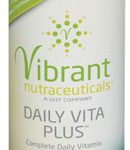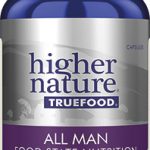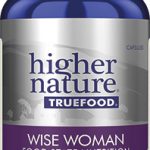If there’s anything that’s vital to the normal functioning and good health of our bodies then it’s undoubtedly vitamins. As is widely known, we gain many of the vitamins we need via our daily diet or the likes of sunshine (that is, from external sources). And, in some cases, of course we consume them in the form of tablets, capsules or liquids – often over the counter or, increasingly nowadays, from online sellers. Indeed, a sign of just how important these specific chemicals are to our bodies is what happens when we’re deficient in them; in short, vitamin deficiency can result in a wide range of hazardous issues and conditions –from anorexia to obesity, depression to fatigue and even digestive and blood disorders to organ malfunction. Basically; very bad news.
So much for why we all need vitamins, but which vitamins should we be consuming? Now, when we ask this question, we’re not talking about Vitamin A or Vitamin B or Vitamin C or so on (we should all be getting a good spread of the ‘alphabet’ vitamins); we mean instead the make-up of these vitamins. How the vitamins are prepared for us in consumable form.
This question comes into play especially if you rely on the likes of supplements, tablets and capsules for your vitamin intake, in addition to gaining them from your natural diet (perhaps you feel you struggle to get all the vitamins you ought to receive from your diet alone?). The point is the issue that arises here is the fact not all vitamins are not created equal, like it or not. That’s to say, too many you tend to consume in this format are synthetic and far from wholly, genuinely good for you. Yes, really.
Natural vs synthetic vitamins
Synthetic vitamins are simply those manufactured synthetically and aren’t derived straight from natural resources. What’s the big deal, you may ask? After all, science can work wonders nowadays and, in any case, haven’t synthetic vitamins been around a long time? Yes, they have, but that doesn’t mean they’re not a definite second best and could, in fact, do your body harm instead of good. The fact is, chemically produced in a lab, as they are, synthetic vitamins are crafted to mimic their genuine, natural counterparts – those that are derived directly from plant material that actually contain the vitamin(s) you’re seeking. Hence natural vitamins actually contain vitamins; very technically speaking, synthetic vitamins don’t.
In scientific terms then, most synthetic vitamins don’t contain the transporters and co-factors you get in natural vitamins, as the former have been ‘isolated’ in order to be mass-produced. Indeed, the US-based Organic Consumers Association recognises the fact synthetic versions aren’t the ‘real deal’ to such an extent that, as they’re isolated vitamins, it simply won’t class them the same way and claims they oughtn’t to be used in the same way as natural vitamins1.
Unlike their isolated, distant cousins then, natural vitamins tend to come complete with other vitamins, as well as minerals and enzymes (especially when you consume them as ‘normally’ as possible from food) which aids the body to metabolise them properly and be ready to use them without confusion and trouble – because this is exactly the way in which it expects to consume vitamins. Conversely, synthetic vitamins often can’t be used by the body right away (thus, wasting time while you expect these vitamins to be doing you good) because the body has to wait to build up or receive minerals to help metabolise them or, possibly worse, use minerals pre-existing in your body to do this, thus potentially helping you develop mineral deficiencies.
Frankly, the simple truth is that synthetic vitamins contain chemicals that, blended and created in a laboratory, were never really meant to be consumed by humans. That’s right; by taking too many synthetic vitamins you could be poisoning yourself. A good example of this is with synthetic fat-soluble vitamins (like Vitamins A, D, E and K). Why? Because, by their nature, they deliver a higher, more concentrated helping of a particular vitamin than is the case when you consume it in its healthy natural form, ensuring then that a good proportion of it’s liable to sit and build up in the body’s fatty tissue and inevitably cause toxicity. Not good.
How to spot synthetic vitamins
Fair dos, when you’re in a shop or buying online, it’s far from always easy to discern whether you’re properly buying ‘natural’ or not – and this is certainly true when it comes to vitamins. So, to avoid purchasing vitamins in their synthetic forms, try to steer clear of the following:
- Aminobenzoic acid (PABA or para-aminobenzoic acid)
- Ascorbic acid (Vitamin C)
- Calcium D-pantothenate (Pantothenic acid)
- Choline chloride/ choline bitartrate (Choline)
- Cyanocobalamin (Vitamin B12)
- dl-alpha tocopherol/ dl-alpha tocopherol acetate/ succinate (Vitamin E)
- Irradiated ergosteral/ calciferol (Vitamin D)
- Pteroylglutamic acid (Folic acid)
- Pyridoxine hydrochloride (Vitamin B6)
- Retinyl palmitate (Vitamin A)
- Riboflavin (Vitamin B2)
- Thiamine mononitrate/ Thiamine hydrochloride (Vitamin B1)
Also try to avoid:
- Carnauba wax
- Magnesium stearate (or stearic acid)
- Monosodium glutamate (MSG)
- Titanium dioxide (it’s carcinogenic!)
Natural multivitamin supplements
So, evidently, naturally derived vitamins are the way to go. But what if, as mentioned briefly above, you feel you’re not getting all the health-giving vitamins, minerals and nutrients from your usual diet (for whatever reason; perhaps because of allergies or complications you have with certain foods)? Well, help is at hand with naturally-derived vitamin supplements. Yes, there certainly are some – indeed, many – of them on the market; you just need to look for them. Indeed, every vitamin supplement we sell here at The Finchley Clinic is naturally-sourced, you can be sure of that. Speaking of which, the following three multivitamin supplements are all good examples:
 Daily Vita Plus – Lemon (Vegetarian) – Great for general health, provides a full range of vitamins (A, B5, B6, B9, B12, C, E, biotin, choline biatrate inositol, niacin, riboflavin and thiamin); note that vitamins in liquid form (like this supplement) are much easier to swallow and absorb into the body than tablets or capsules.
Daily Vita Plus – Lemon (Vegetarian) – Great for general health, provides a full range of vitamins (A, B5, B6, B9, B12, C, E, biotin, choline biatrate inositol, niacin, riboflavin and thiamin); note that vitamins in liquid form (like this supplement) are much easier to swallow and absorb into the body than tablets or capsules.
 True Food All Man (180 capsules) – a complete, thoroughly food-based multivitamin and multi-nutrient formulation for men of all ages, which provides daily support for those leading busy 21st Century lives.
True Food All Man (180 capsules) – a complete, thoroughly food-based multivitamin and multi-nutrient formulation for men of all ages, which provides daily support for those leading busy 21st Century lives.
 True Food Wise Woman (180 capsules) – the female-focused version of ‘All Man’, this supplement also provides a complete spectrum of food-based essential vitamins and minerals for high bioavailability.
True Food Wise Woman (180 capsules) – the female-focused version of ‘All Man’, this supplement also provides a complete spectrum of food-based essential vitamins and minerals for high bioavailability.
Reference:
- Clement B. ‘Nutri-Con: The Truth About Vitamins & Supplements’. The Vitamin Myth Exposed. 2005 December 31.
